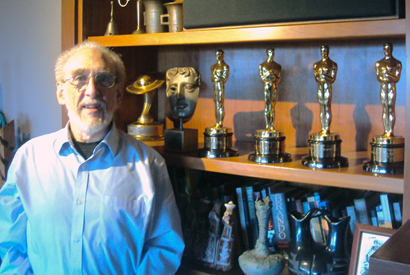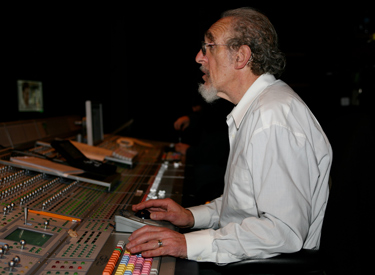The Oscars? Berkeley adjunct’s been there, won that
With Academy Awards for his work on Apocalypse Now, The Right Stuff, Amadeus and The English Patient, the San Francisco native has found a different kind of satisfaction teaching "The Sound of Film" to Berkeley undergrads for the past 13 years.

February 19, 2013
![]() BERKELEY — Every year when a fresh batch of Academy Awards is handed out, millions of movie fans find themselves imagining what it would be like to be up on stage soaking in the applause of the Hollywood elite, Oscar in hand.
BERKELEY — Every year when a fresh batch of Academy Awards is handed out, millions of movie fans find themselves imagining what it would be like to be up on stage soaking in the applause of the Hollywood elite, Oscar in hand.

Berger at home, with four friends named Oscar (Steve Hockensmith photo)
But one UC Berkeley adjunct professor doesn’t have to imagine. He’s lived the dream.
Mark Berger has taught “Film 140: The Sound of Film” to Berkeley undergrads for 13 years. If his résumé weren’t enough to convince you that he was the person for the job — he’s served as a sound mixer on more than 165 movies — a glance at his mantelpiece might.
Standing at attention there are four small (but surprisingly heavy) gold figures: the Academy Awards he won for his work on Apocalypse Now, The Right Stuff, Amadeus and The English Patient. When asked if he went down to Los Angeles to attend the awards ceremonies in person, Berger laughs.
“Of course we went down,” he says. “We’re going to stay home and watch it on television? It’s like Cinderella.”
While not exactly a Cinderella story, Berger’s own life has had a few near-magical transformations. The San Francisco native has gone from committed campus radical to would-be scientist and academic to Oscar-winning sound man to teacher.
The journey began in 1960, when Berger began his studies at Berkeley, expecting to major in physics. Arriving just as the Free Speech Movement was being born, his time was consumed by demonstrations and mathematics.
It was calculus, not campus activism, that started dragging down Berger’s grades, he says. He wound up majoring in psychology.
“I’d always been attracted to the idea of understanding perception, and there were a couple professors who were instrumental in awakening an appreciation for the beauty of the brain and the way the body functioned,” Berger says. “So I just decided, well, if I can’t rise to the top in math, I might as well focus on something that I’m really interested in.”

Berger mixing sound for “Journey to the Center of the Earth” (Photo by Bill Sheppard, dbc Sound, Vancouver)
That applied outside the classroom, too. Berger was getting more and more involved in a campus group that created radio documentaries and recorded concerts at Hertz Hall. And his activism continued, leading after graduation to a stint in Colombia as a Peace Corps volunteer.
When he returned to California two and a half years later, Berger picked up where he left off, pursuing a graduate degree in psychology at UCLA. Eventually, though, he decided that running rats through mazes couldn’t compete with the excitement of his anti-war activism and his work editing radio programs, and he dropped out of grad school. Soon after, Berger stepped onto the path that would lead him back to Berkeley — and to the podium at the Academy Awards.
An acquaintance heading to the South to shoot a documentary on the civil-rights movement asked him to come along as his sound man. Despite his lack of experience doing sound for film, Berger agreed. He enjoyed himself so much that when the project was completed he went looking for more work along the same lines. That led to jobs with the U.S. Information Agency and KQED.
His work on a KQED documentary, The Place for No Story, brought him to the attention of Walter Murch, an editor and sound mixer who’d been working with Bay Area filmmakers George Lucas and Francis Ford Coppola. Murch tried to recruit him for Coppola’s newest film — a classic-in-the-making called The Conversation — but Berger was already committed to a trip to Cuba to record an interview with Fidel Castro. He contacted Murch on his return, but was too late for The Conversation.
“He said, ‘Well, we have another film we’re doing. How’d you like to work on that?'” Berger recalls.
The film? The Godfather, Part II.
Right time, right place, right stuff
It was an offer Berger couldn’t refuse, and his feature film career was off to an auspicious start. His next project with Coppola and Murch, Apocalypse Now, led to the first of four trips to the Academy Awards for him and his wife, Berkeley City Council member Susan Wengraf.
“A limousine pulls up to the front door, and inside there’s Champagne and flowers, and off you go to the airport,” Berger says of a typical jaunt to the Oscars. “You fly down to Los Angeles and get in another limo and they take you to the hotel, and there’s a bunch of flowers in your room and a basket of Champagne and chocolates and all sorts of goodies, and the rest is just a blur…. It’s this fairy tale that just sort of rushes by.”
While racking up the best win-loss record in Academy Awards history — four nominations, four Oscars — Berger worked on dozens of prestigious projects. His CV includes One Flew Over the Cuckoo’s Nest, Burden of Dreams, Kiss of the Spider Woman, Blue Velvet, The Mosquito Coast, The Unbearable Lightness of Being, Rushmore, The Talented Mr. Ripley, The Royal Tennenbaums and Munich.
Berger was able to stay busy without leaving the Bay Area because, for a while anyway, Hollywood filmmakers were willing to look beyond L.A. for their sound mixers.
“I was privileged to be in the right place at the right time with the right stuff, and have a lot of luck,” Berger says. “If you were doing a big action-adventure film, you went to George Lucas and Skywalker Sound. If you wanted a dramatic feature with wonderful music and impeccable dialogue, you came to the Saul Zaentz Film Center. And if you were a smaller production, you went to Francis Coppola and his studio in the Little Fox Theatre. So it was a great time.”
Too great, in fact, to last. But just as sound work was winding down for Berger, a new opportunity presented itself — one that led him to the UC Berkeley Department of Film and Media. In the late 1990s, Berger began guest lecturing on sound at the invitation of film professor Marilyn Fabe. He was such a hit with students that Fabe and Linda Williams, a film scholar and department colleague, persuaded him to create an entire class devoted to the use of sound in cinema.
“A general theme in my life is saying ‘No problem’ and then figuring it out later,” Berger says. “So I said ‘yes’ not realizing the incredible amount of work that was involved in the research. I ended up spending a lot of time putting together a syllabus that was essentially based on the music courses I’d taken when I was at Berkeley — what used to be called ‘music appreciation.'”
In his Berkeley course, Berger doesn’t just teach students to appreciate film sound. He also offers primers on music and how changes in technology influence the uses of sound in film. And he uses his old specialties — psychology and the science of perception — to explore why certain approaches affect audiences the way they do.
“The idea is to give people the vocabulary and the concepts to be able to analyze and express what they’re hearing at the same time they’re hearing it,” Berger explains. “I tell them, ‘This is going to completely destroy your ability to watch a film the same way.'”
The course has become a springtime perennial at Berkeley, and Berger has taught variations on it at schools in Chile, Ireland, Spain, Israel and elsewhere. In fact, teaching and traveling now take up the majority of his time (though he still works on a handful of films each year).
“I love it when, at the end of the course, I hear, ‘Wow, I never knew this was going on — film has taken on a whole dimension for me,'” Berger says. “That’s tremendously rewarding.”
To meet other persons of interest, click above.
Persons of Interest is a regular feature on the UC Berkeley NewsCenter. Know a member of the campus community — staff, student or faculty — who might make a good subject? Send us a note at [email protected].